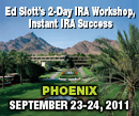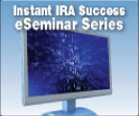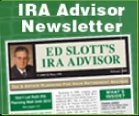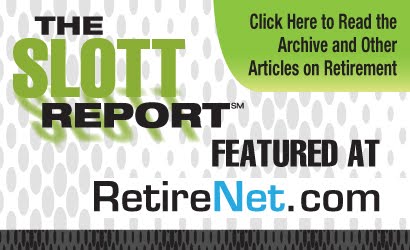This week's
Slott Report Mailbag delves into the oftentimes complicated world of required minimum distributions (RMDs). We look at RMDs after conversions, recharacterizations and the "still-working" exception. We also answer a question about when you can recharacterize a Roth IRA conversion.
As always, we stress the importance of working with a competent, educated financial advisor to keep your retirement nest egg safe and secure. Find one in your area at this link.
1.
Happy New Year. I get your regular updates from
www.irahelp.com and
www.theslottreport.com, and they are great!
I may need to access around $11,000 from my Roth IRA, and I want to understand what the cost, fees and tax (if any) implications are. I spoke to a rep over the weekend and he said possibly re-characterizing the conversion could be helpful. Further, he suggested going to
irs.gov and researching pub 590 (page 60 chapter 2) as it kind of spells out what the implications would be pertaining to my proposed scenario. So, besides a sales charge, 10% withdrawal penalty and taxes on earnings, what total costs would I be saddled with if I access this money?
If memory serves me correctly, I converted the IRA to Roth in 2010 and my accountant is spreading the taxes over 2 years. This may or may not effect what I am trying to do.
Any feedback on this would be greatly appreciated.
Thanks,
Jason De Ruggiero
Answer:
You should look at IRS Pub. 590 as it outlines the rules about recharacterizations and when you can and cannot recharacterize.
If you converted to a Roth in 2010 you had up to October 15, 2011 to
recharacterize.
If you have had any Roth IRA established for 5 years and you are over age 59 1/2, there is no problem accessing any funds in your Roth IRA. You can always withdraw a converted amount without incurring a penalty or income taxes if the requirements mentioned above are met. It is generally the earnings in the Roth account that cannot be accessed without income taxes unless certain requirements are met. The ordering rules state that when taking withdrawals all Roth IRAs are considered one account. All contributions are considered to come out first, then converted amounts (first in, first out) and lastly earnings. We can’t be more specific on your situation without knowing what amounts have gone into your Roth accounts, if those amounts were contributions or conversions, your age, and when your first Roth IRA was established.
2.
If a 71-year-old is fully employed this year, contributing to their 401(k), when must they take their first RMD (required minimum distribution)? I have read it’s the year after they retire. If that’s true, do they have to take two distributions (April and December) that year? How long can they delay taking an RMD if they are fully employed? I have read one has to take a distribution the year they turn 75.
Thank you for your help!
Answer:
If you are less than a 5% owner of the company, are still working after age 70 ½, and if the employer plan allows, then you would not have to commence RMDs until the year you separate from service. You should check the plan document or summary plan description to see if the plan has that provision in it. The first RMD is due for the year of separation from service and can be deferred until April 1 of the following year. If it is deferred, then two distributions will have to come out in that year. I believe the age 75 you mentioned applies only to 403(b) plans. In a 403(b) plan, balances prior to 1/1/86 don't have to be used for calculating RMDs at age 70 1/2. Those balances will then be added back in for RMDs when the participant attains age 75.
3.
Good afternoon Ed!
Here are the facts: A 61-year-old taxpayer converted his traditional IRA to a Roth IRA in 2010. In January 2012, he withdraws the entire amount of the converted IRA including contributions, conversion amounts, and earnings.
My question is this. Can the taxpayer contribute only the earnings of the converted IRA back to the converted IRA account to avoid taxation on the earnings in 2012?
Thanks,
Gary
Answer:
A taxpayer has 60 days from the receipt of Roth IRA funds to do a rollover to another Roth IRA account. It is up to the taxpayer to track which Roth funds are derived from contributions to a Roth IRA, conversions to a Roth IRA, and earnings. In addition, all Roth accounts are considered one account for the purposes of the distribution rules. Distributions are deemed to come first from contributions, then conversions (first in, first out), and lastly from earnings. Assuming the taxpayer has emptied all Roth accounts and does only a partial rollover, you would have to assume that the first dollars rolled over would be earnings. You should go through the calculation on Part IV of IRS Form 8606 to see how it will work out.
There will be no tax on the earnings if the taxpayer had established any Roth IRA in 2007 or earlier since he is over the age of 59 ½.
By Marvin Rotenberg and Jared Trexler
------------------------------------------------------------------------------
Comment, Question, Discussion Topic on your mind? Click on the
Blue Comment Link below and leave your thoughts then check back to see what other consumers and advisors think.
Also, share this article on Facebook, Twitter, and show us you approve with the Google +1 app under each title.
*Copyright 2012 Ed Slott and Company, LLC
 You have just inherited an IRA or employer plan from someone other than your spouse. What now?
You have just inherited an IRA or employer plan from someone other than your spouse. What now?








